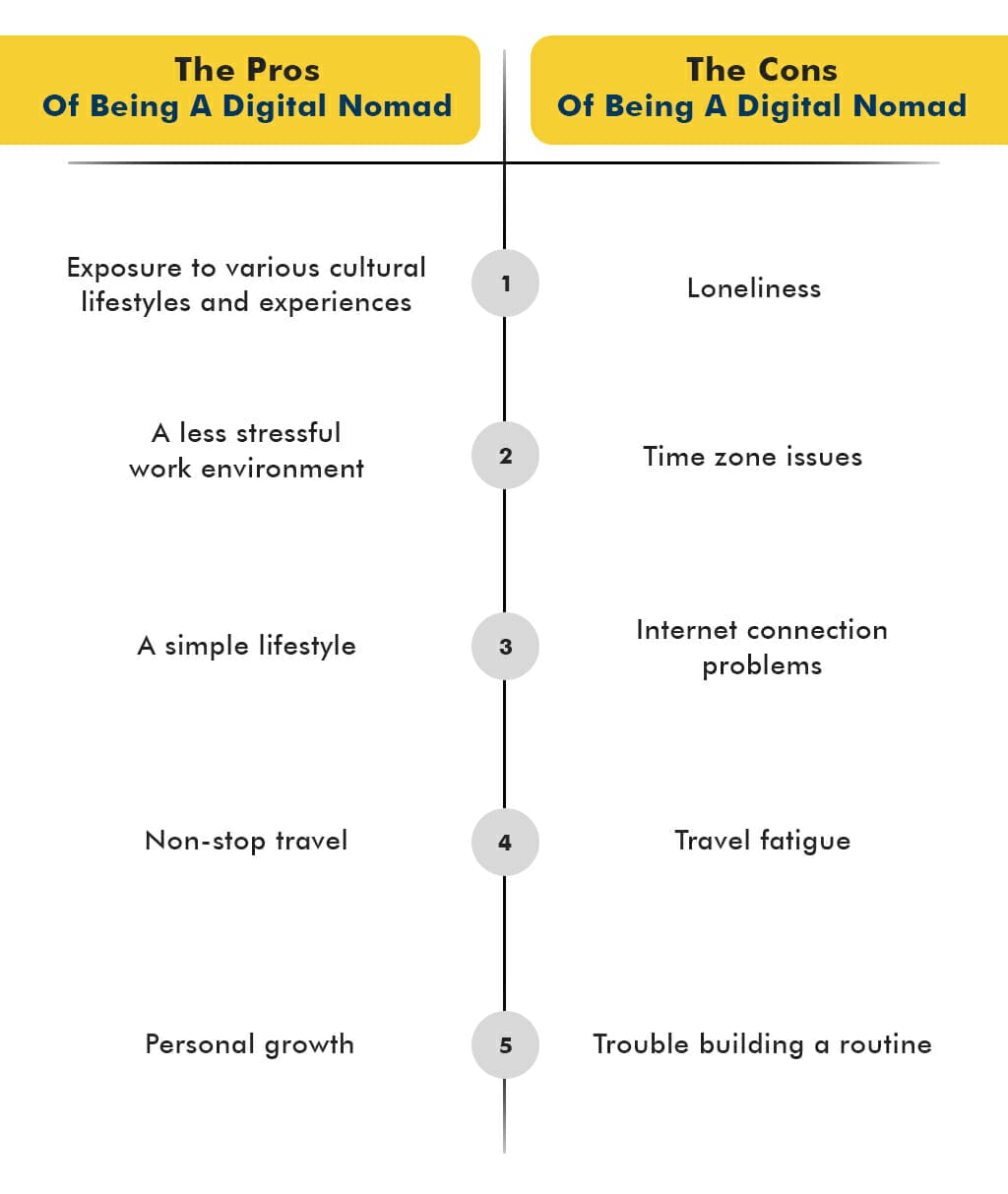Ready To Embark On The Adventure Of Your Life As a Digital Nomad?
The thought of working from a hammock or the beach nestled in a tropical location appeals to many. A lot of us sit in our cubicles every day and dream of working from the mountains or the comfort of our homes. Some people have even made this dream a reality by becoming digital nomads.
Today, 15.5 million people are living as digital nomads worldwide. According to statistics, the number is steadily increasing after the pandemic.
The ability to work from and live anywhere has opened up a world of opportunities for many. There are around 35 million digital nomads in the world right now, and you can be one of them!
What Is A Digital Nomad?
Digital nomads are location-independent employees who work at the location of their preference. Their lifestyle consists of traveling while continuing to develop their professional careers. They often work in cafés or coworking spaces, relying on the internet and electronic devices.
Digital Nomad Pros And Cons
Before you can adopt a digital nomad lifestyle, you need to know all of its advantages and disadvantages. 
How To Become A Digital Nomad From Zero

1. Identify Your Skills
The first step towards adopting a digital nomad lifestyle is to figure out how to make money on the road, or you will burn right through your savings. But before you can do that, you need to find the right job for a digital nomad lifestyle. So, which skills can help you land a remote job?
To figure out these skills start by looking at job descriptions of people in similar positions that you are aiming for and go through their LinkedIn profiles for additional information.
This part often requires a lot of research and introspection. But do not be afraid to devote ample time to it. If there are certain skills that you are lacking, there are quick courses on Udemy, YouTube, and Coursera to help you become a professional and acquire those additional skills.
You can also build a portfolio for yourself to showcase your experience and skills and allow potential employers to see whether or not you are the right fit for a role.
2. Think Of Ways To Make Money
To adopt the digital nomad lifestyle you need to have a stable income. Before you can quit your current job, you need to find a way to make money on the Internet.
These jobs are great options for those looking to build a digital nomad lifestyle:
- Blogging
- Customer service
- Bookkeeping
- Consulting
- Freelance writing
- Marketing
- SEO agency work
- Software development
- Virtual assistance
- Website Designing
Your job search will vary depending on the skills identified and the experiences and personal preferences you have.
Going Through Job Boards
With the right skill set and mindset, you can begin searching for jobs online. Websites like We Work Remotely, Upwork, and FlexJobs are great places to start.
Network
The sooner you start networking in the process of becoming a digital nomad, the quicker you can build relationships with professionals in the industry. Reach out to other digital nomads on LinkedIn or other professional websites to forge valuable bonds.
You can also visit company websites to check for any virtual seminars or workshops and get to know people there.
3. Pick Out The Right Equipment
Once you have figured out what you are going to be doing, you will need the right equipment for it. Leading a digital nomad lifestyle entails that you need to have a good laptop and an internet connection, but you may need additional things as well.
For example, as a customer service representative, you will need a good-quality headset to allow you to take calls. You may also need a VPN for smooth browsing no matter where you are located.
Ensure A Strong Internet Connection
Location-independent employees can only work if they have reliable and fast connections at their service. So, be sure to contact the local service providers in the country you are thinking of settling in and get information on connection speeds.
You can also purchase international cell phone plans or a portable WiFi device to make life easier for you.
4. Consider Popular Digital Nomad Destinations
You can figure out your money and your taxes, but one of the most important questions to answer is ‘where will you go?’. Most people have a dream location in mind, but in case you don’t, Forbes conducted a survey to find preferred digital nomad destinations.
- Norway
- Mexico
- Germany
- Portugal
- Iceland
- Greece
- Costa Rica
- Jamaica
- Spain
- Bermuda
But how can you decide which destination is right for you? Be sure to consider the following factors!
At the end of the day, the documentation and visa process, safety, and WiFi facilities are some of the most important factors which influence where you will be living. But it is always good to consider several other things too.
5. Figure Out Taxes
Do digital nomads have to pay taxes? This is a question that pops up every now and then when people are considering adopting the lifestyle.
Some countries allow you to claim the Foreign Earned Income Exclusion if you are spending the better part of your year outside your home country. However, you can also set up a company in digital nomad-friendly countries, such as Singapore, and benefit from tax exemptions.
Here are some other countries that do not charge taxes from digital nomads:
- Anguilla
- Antigua and Barbuda
- Aruba
- Bahamas
- Barbados
- Bermuda
- Cabo Verde
- Cayman Islands
- Costa Rica
- Croatia
- Curaçao
- Dominica
- Indonesia
- Montserrat
- Romania
- Seychelles
- UAE (Dubai)
But it is always better to speak to a good accountant specializing in foreign taxes before you can make the switch to being a digital nomad.
6. Setting Aside An Emergency Fund
When traveling alone, it is always a good idea to prepare an emergency fund for any unforeseen circumstances. Getting robbed, a car accident, political unrest, or even a worldwide pandemic can put you in quite a pickle.
In such cases, you will want to fly home at the earliest and perhaps get accommodation. This emergency fund will help you weather any storm that comes your way without an income.
Using Travel Insurance
Many individuals may believe that they don’t need travel insurance when planning their digital nomad lifestyle since they are only traveling for a short period. However, regardless of the trip’s duration, sickness or injury can happen.
Travel insurance can cover medical expenses and other costs associated with illness or injury, making it essential for digital nomads to consider.
7. Visa Program
After the pandemic, many countries across the globe launched visa programs for digital nomads. They help you settle in a new location and simplify taxes, insurance, and internal administration.
Some of these visas can be quite expensive, but others are more affordable and require a simple application process. Here are some digital nomad visas you can apply for.
1. Germany Freelancer Visa
This visa grants foreign freelancers and self-employed individuals the right to reside in Germany for a period of 6 months to 3 years. However, it is worth noting that the visa application process can take up to 3 to 4 months to be approved.
The income requirements for this visa are $105. You need to earn enough to be self-sustainable. The visa length can be up to three years.
2. Dubai Digital Nomad Visa
The minimum monthly income requirement to qualify for the digital nomad visa in Dubai has been reduced from $5,000 to $3,500. This reduction is great for remote workers looking for a hassle-free way to obtain a digital nomad visa. You can get the visa application process done online in only five to seven days!
The digital nomad visa in Dubai offers various benefits, such as the opportunity to establish local bank accounts, enroll children in local schools, and apply for a bank loan in the UAE.
3. Portugal Digital Nomad Visa
Portugal has recently launched a digital nomad visa program called the ‘Portugal Temporary-Stay Visa. Other visa options are available for foreigners wishing to reside in Portugal, such as the D7 Passive Income Visa, the D2 Entrepreneur Visa, and Portugal Golden Visa.
To be eligible for the Portugal Temporary-Stay Visa, you must maintain a minimum income of $2,950 per month which is valid for one year and can be extended for up to four years.
4. Rentista Visa For Digital Nomads In Costa Rica
It’s one of the most sought-after and easiest digital nomad visas available at the moment.
Costa Rica’s beautiful beaches and low cost of living have attracted digital nomads from all over the world, and with the digital nomad visa, they can now live in the country tax-free for up to two years!
The best part is that the application process is online, and you only need to submit four documents: a copy of your passport, proof of remote work, certified bank statements, and an international health insurance policy. It couldn’t be easier!
5. Spain Digital Nomad Visa
Spain has recently launched a new digital nomad visa at the start of 2023, aimed at remote workers who want to work and live in the country simultaneously. But you should have been working remotely for at least one year and must not have been a resident of Spain for the past five years.
As per this visa, remote workers must have a minimum balance of $2,215 per month in their account. And the visa duration is one year, with the option to reapply for up to four additional years, providing a chance to extend their stay in Spain.
8. Sort Out Your Accommodation
Another thing that you need to sort out is your accommodation. For example, Airbnb has various deals if you book in advance or for an extended period of time. You can also choose to live in co-living spaces and combine a professional and residential space. There are also hostels for you to book.
Here is how you can find the best accommodation overseas.
- Search for reviews and comments about the area to find deals.
- Subscribe to several Facebook groups and communities that help travelers and digital nomads find housing.
- Search on websites, such as BackPackers and WorkAway, to find work exchange solutions for free housing. Airbnb also offers affordable accommodation options that you can search for.
9. Find Your Digital Nomad Community
As you try to figure out the logistical and financial challenges that come with the digital nomad lifestyle, do not forget about yourself. One other issue that could arise as a digital nomad is the feeling of isolation and loneliness. This is why it is important for you to find like-minded people to connect with.
So, be sure to take part in organized activities and groups in your surroundings, attend events, or join online platforms to create groups. You could also indulge in a new sport or hobby or just start working in coworking spaces to build bonds with people.
3 Digital Nomad Myths You Should Know

There are various misconceptions that people believe in, but we are here to debunk them all! Here are some common myths related to digital nomads and the facts that set these straight.
1. It Is A Never-Ending Vacation
The most common myth regarding digital nomads is that they are always on the road, traveling to exotic locations and sunbathing on beaches. However, location-independent workers don’t just sit around all day sipping cocktails.
Actually, remote work is much like working in an office every day. They have to complete tasks just like everyone else and work around 30 to 40 hours a week.
2. Digital Nomads Do Not Have Any Worries
Wrong! All lifestyles have their own set of challenges, and so does digital nomadism. Same as other people, digital nomads have various needs as well. They have to pay for food and accommodation and figure out taxes, as well as travel insurance. They may not be worried about bills like other people, but they have their fair share of problems to think about.
3. Digital Nomads Are Lonely
People think that being a digital nomad can be lonely since you are on your own for quite a bit. But traveling does not restrict you from forging meaningful connections with people. Rather, it opens up the chance for digital nomads to establish roots wherever they go.
Moreover, social media and the advancement of technology have made the world a smaller place!
Enjoy Your Independence
After the pandemic, digital nomadism has increased rapidly. Loads of people are now abandoning their age-old cubicles and jumping on the bandwagon to travel to their favorite places and work from wherever they want.
If you want to be a part of the digital nomad movement, then there is nothing stopping you. Follow the steps outlined above, and you can pack up your bags and set out in no time!






